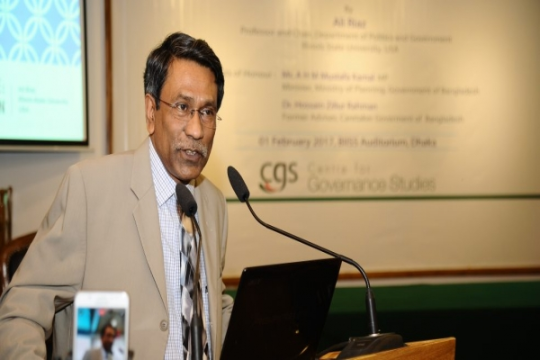Governance: A Critical Examination
01 February 2017
s14
Dr. Hossain Zillur Rahman, Adviser of the former Caretaker Government was the Guest of Honor. The chairman of CGS professor Ataur Rahman presided over the seminar that was moderated by Executive Director of CGS Mr. Zillur Rahman. In the keynote speech, Illinois State University Prof. Ali Riaz critically examined the various determinants of the concept of governance. He emphasized the need for four capacities of the state: legitimization capacity, coercive capacity, extractive capacity and administrative capacity.
The legitimization capacity’ forms the core capacities that a democratic state must have for its functioning if its governance has to improve. He regretted that the capacity of Bangladesh state in terms of legitimacy had been disregarded or marginalised over the years. He underlined the need for political negotiation between the elite and the non-elite in the state governance system. Some speakers maintained that corruption is being institutionalized and the rule of law is on the back seat in contrary to aspirations of the independence of the nation.
hey said that the people nowadays seemed to be reluctant to cast votes as they did not find their wishes reflected in the policymaking. Former minister Dr. Mizanur Rahman Shelley said that the country was developing as much as it was falling morally. Former caretaker government adviser Hossain Zillur Rahman said that the incumbent government had brought development and democracy face-to-face. ‘The ground reality is chronic capitalism and corruption are being institutionalized…the rule of law takes on the back seat.’ He deplored that the basic principles of the nation were now being subverted.
The legitimacy of governance depends on whether the people who are affected by the government’s decision and policies have participation in it or not, said Dr Zillur Rahman Khan, Rosebush Professor Emeritus of the University of Wisconsin, USA. Local governance expert Tofail Ahmed said, ‘We are having a legitimacy crisis now. People are not getting their representations in the governance and losing their interest in the system.’ The country is presently facing a grave legitimacy crisis in the governance process from the grassroots to the top. New Age editor Nurul Kabir said that ‘popular legitimacy’ and accountability at all levels were important issues in the state governance. He underlined the need for bringing back the state to democracy so that it could be governed democratically.
A strong nexus between politics and business in some cases with the link to criminality virtually undermines political accountability, mother of all accountability, and weakens the state’s capacity, said Manzoor Hassan, executive director of South Asian Institute of Advanced Legal and Human Rights Studies. “It is not in the general mindset that it is the people who are sovereign and the public office bearers have to serve the people,” said Tania Amir, a Supreme Court lawyer and activist. Dr Badiul Alam Majumdar of SHUZON and Prof Rashed Al Titumir of Dhaka University also spoke at the Seminar emphasizing the need for people’s voice and accountability in the governance process of Bangladesh.
